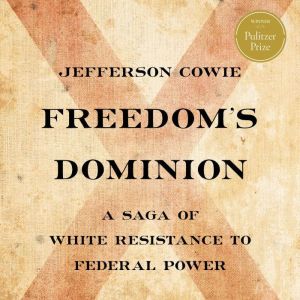Quotes
“[G]ripping and haunting… Cowie’s meticulous accumulation of detail and candid assessments… make for distressing yet essential reading. This is history at its most vital.”—Publishers Weekly (starred review)
"Jefferson Cowie has a knack for publishing instant classics: books that change historians' conversations. This is his most extraordinary yet. With eloquence and with brilliance, he delves deep into the annals of a specific place, Barbour County, Alabama, in order to excavate the foundations of America's darkest and most enduring story: how 'freedom' became a national alibi for cruelty, inequity, and reaction. As soon as I finished reading it, I wanted to start over and absorb it all over again."
—Rick Perlstein, author of Reaganland
“Jefferson Cowie has given us a deep history of the long war on the federal government—especially when it came to policies advancing class and race equality, of the evolution of White grievance politics, and of a new way of thinking about the psychic structure of American Exceptionalism. With eloquent, precise prose, Cowie clears away the cobwebs to reveal a national malady long in the making.”—Greg Grandin, Pulitzer Prize-winning author of The End of the Myth
“A fascinating book, Freedom’s Dominion takes us to the states’-rights stronghold of Barbour County, Alabama. Barbour was the birthplace of Governor George Wallace, whose infamous defense of segregation described integration as tyranny, segregation as freedom, and equal access to the ballot as a threat to individual rights. Wallace’s views illustrate the confounding interdependence of ideas about freedom and oppression in American politics—as does Barbour County’s long history of state-building rooted in antiblack violence, white supremacist rule, and Indian land dispossession. Freedom’s Dominion offers a searing account of that history that leaves one wondering whether American freedom can ever be disentangled from the causes it has supported.”—Mia Bay, author of Traveling Black
“Jefferson Cowie’s Freedom’s Dominion is a magisterial narrative history of white grievance politics. Cowie reveals the origins of these often hypocritical and confounding perspectives, in which those who stole, enslaved, and segregated would themselves claim to be victims of federal overreach, even as they oppressed so many others. Cowie’s terrific book explains the Southern roots of that racialized ideology and reveals how one of the most influential segregationist rhetoricians of the 1960s helped repackage this powerful form of regional white identity politics for the rest of the nation.”
—William Sturkey, author of Hattiesburg
“Freedom’s Dominion covers centuries of American history in Eufala, Alabama, from the violence of settler colonialism through the ascent of arch-segregationist George Wallace, the region’s most famous native son. Jefferson Cowie is interested in how people in power—almost always white men—used claims of freedom to dominate and enslave others, and how they articulated domination as resistance to a tyrannical federal government. This history has urgent implications for how we understand white supremacist and anti-government politics today.”
—Kathleen Belew, author of Bring the War Home


![]()

